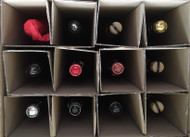Your beer cellar in 3 steps
Posted by Isabelle Bellet on 21st Apr 2019
For a long time, the cellar was reserved for wine, a drink considered noble, and which requires optimal storage conditions to avoid losing its taste. But recently, the cellar has also opened up to beer, which has gained its reputation in recent years, thanks to certain breweries and their treasures.
To create your beer cellar into your home, here are some tips.
1) Choose your beers carefully. Not all beers can be kept.
2) Choose a cool, dry place without light.
3) Organize the storage by type of beer and date
1) Choose your beers carefully. Not all beers can be stored.
There are of course several categories of beer, and several types of containers that can be stored in the cellar or not.
Among the beers that can be stored in the cellar are those that will bonnify with the passing of time (such as wine), and those which will not necessarily improve but not deteriorate. Not all of them benefit from getting older, and it also depends on your personal preferences.
Trappist, Abbey Beers, Triple Belge and Gueuzes (or acidic beers with a high alcohol content) will keep very long, some up to 20 years.
In general, traditional beers (unpasteurized), with refermentation in bottles, can be kept for a long time in the cellar (at least 2 years). Some will evolve very positively. Their sensory characteristics will change, just like wine.
A beer refermented in a traditional bottle will not have the same aroma between the first and third years of ageing. By using the time factor, the range of flavours is infinitely increased and the number of tastings for the same beer can be multiplied.
There is no point in storing an industrial (pasteurized) beer, because it will no longer move, no longer containing any living yeast.
IPA beers, which are more fragile due to the raw hopping technique, will not benefit from prolonged storage, on the contrary. It is better to drink them quickly to enjoy their beloved bitterness.
Similarly, white beers, with low alcohol content, will be consumed quickly.
But be careful, only bottled beers can improve in the cellar.
I don't advise you to age your cans. What protects the liquid from the metal is a thin layer of plastic. If it is not dangerous in a can of cold beer, exposure for several years could be dangerous.
As for the capped bottles, they can be kept for a while depending on the type of beer, but for a much shorter period of time than the corked bottles, which are superior in terms of sealing and refermentation yeast.
Why is there a use-by date on beer bottles?
By law, the label of every food product must indicate an expiry date. Beverages are also included, unless the alcohol content is 10% ABV or more. Beer generally contains less than 10% alcohol by volume, so the brewer is required to indicate an expiry date. This is not the case for wine, since the alcohol content is higher. Breweries indicate a date in the form "preferably before". This means that the beer will retain its specific characteristics in terms of flavour, colour and aroma at least until the date indicated. Until then, your favorite brewery will have the taste you expect. Beyond that, the flavours can start to evolve. And probably for the better. You can enjoy it according to your personal taste.
The Best Before Date is just "administrative" and in my opinion an aberration for storage beers.
2) Choose a cool, dry place without light.
For your beers, you can opt for a wine cellar, which will offer the same advantages.
Choose a dry place, without direct light and at a constant temperature all year round (between 10°C and 16°C). For example in a cellar, garage or attic.
Light has a sterilizing action that leads in the short term to a decrease in the number of yeast cells involved in the re-fermentation of beer. In the long term, the flavours are altered and a characteristic "papier mâché" taste appears.
The place must be cool enough, ideally refrigerated or even air-conditioned, if the place requires it. But what is very important is a constant temperature, as the temperature differences are very bad for beer.
At a constant temperature of 8°C, your beers will keep very long but the cold will retain the aromatic development. At a constant temperature of 20°C, they will not keep for long and the heat will accelerate the aromatic development.
This is why it is not advisable to keep craft beers in the fridge because the yeasts will not be able to develop and develop the flavours of these beers. On the other hand, all pasteurized industrial beers will be fine in the fridge. A pasteurized beer can stay in the fridge because, in any case, it will no longer move, as the yeasts are dead. Practical, but pasteurization has a serious disadvantage: it reduces the taste profile more or less strongly. If you are used to drinking craft beers, pasteurized beers will seem very bland....
Should bottles be kept upright or lying down?
The rule is simple: a capped beer can be kept upright, a bottle with a cork stopper can be kept lying down, like wine, so that the stopper does not dry out.
The capped bottles will be kept upright to avoid prolonged contact of the liquid with the cap. Metal gives an oxidized taste to your beers after a while.
By putting the corked bottles to bed, the liquid-impregnated cork will tend to "swell" and maintain better tightness, which will also have the advantage of preventing air from entering the bottle and thus avoiding any oxidation phenomenon.
The lying position also promotes the creation of a larger contact surface between the liquid and the yeast, which increases the rate of taste development.
If you have a bottle with a cork stopper and refermentation in the bottle, we recommend that you straighten the bottle a few days before opening it. This will allow the yeast to redeposit at the bottom of the bottle.
3) Organize the storage by type of beer and date
We recommend that you create a GUEUZE corner (20 years' storage life), a BIERES D'ABBAYE and TRAPPISTE corner (2 to 5 years' storage life depending on the degree of alcohol) and a SPECIAL BROWN corner, including STOUT, PORTER, VIEILLES BRUNES, infused with Whisky, aged in oak casks,... (storage period up to 10 years).
At Beer My Guest, we inform you of the on-call time recommended by the brewery for each beer, which will allow you to mention the ideal period of consumption on the label in your cellar and thus always be able to choose the right beer to enjoy at the right time.
Here are 12 ideal beers in a box to start your beer cellar:
They are available in the Beer Cellar Box at Beer My Guest.
Preserving beer is a passion, and experimentation in this field is a unique experience.
Order your Beer Cellar Box now.
Feel free to share your experiences!

